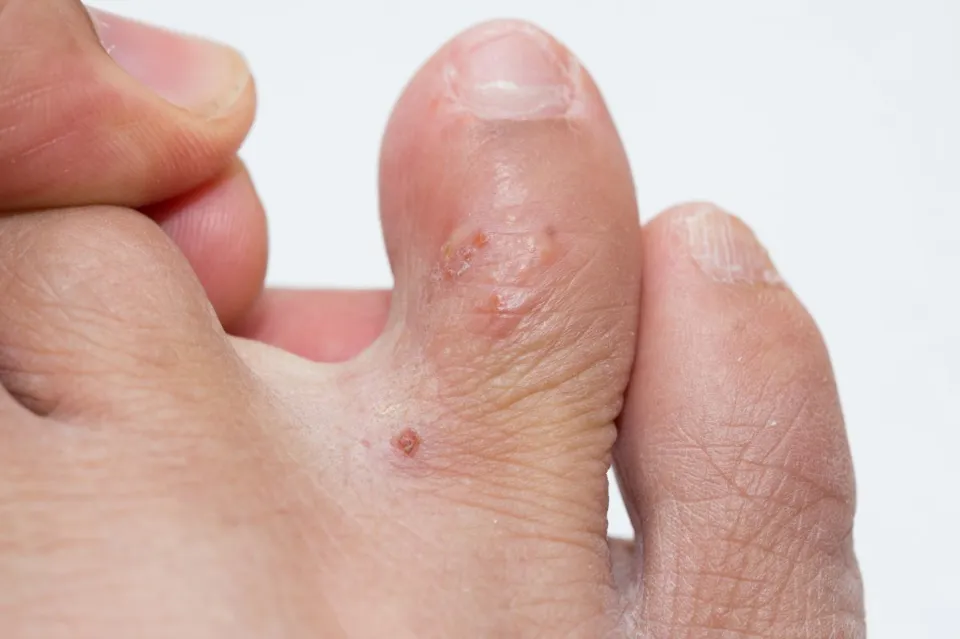
Is Vaseline Good for Eczema – Will It Help Itchy Skin?
Are you having trouble soothing your itchy, dry, irritated, and possibly weeping eczema flare-ups? Chronic skin inflammation called eczema is linked to a skin barrier that isn’t functioning properly and has trouble retaining moisture. Over the years, eczema sufferers have attempted to soothe and cover these flare-ups by using Vaseline.Eczema
Eczema patients and those with sensitive skin can benefit from using Vaseline. it can help soothe eczema-prone skin by relieving dryness and promoting healing.
Learn more about petroleum jelly’s eczema-treating properties, how to apply it, and any possible negative effects as you read on. You’ll also discover some additional all-natural treatment options.
What is Vaseline?
Petroleum jelly has been used to help heal wounds and dry skin for over a century. The jelly-like substance is made up of a combination of mineral oils and waxes. With a water-protective barrier that seals your skin and helps it retain moisture, petroleum, the primary ingredient, promotes healing.
Vaseline is the most common brand name, containing 100% petroleum jelly, but you’ll also find this ingredient in many other common moisturizers, conditioners, lip balms, baby care, and beauty products.
Read More: Is Vaseline Good for Dry Feet
Is Petroleum Jelly a Good Treatment for Eczema?
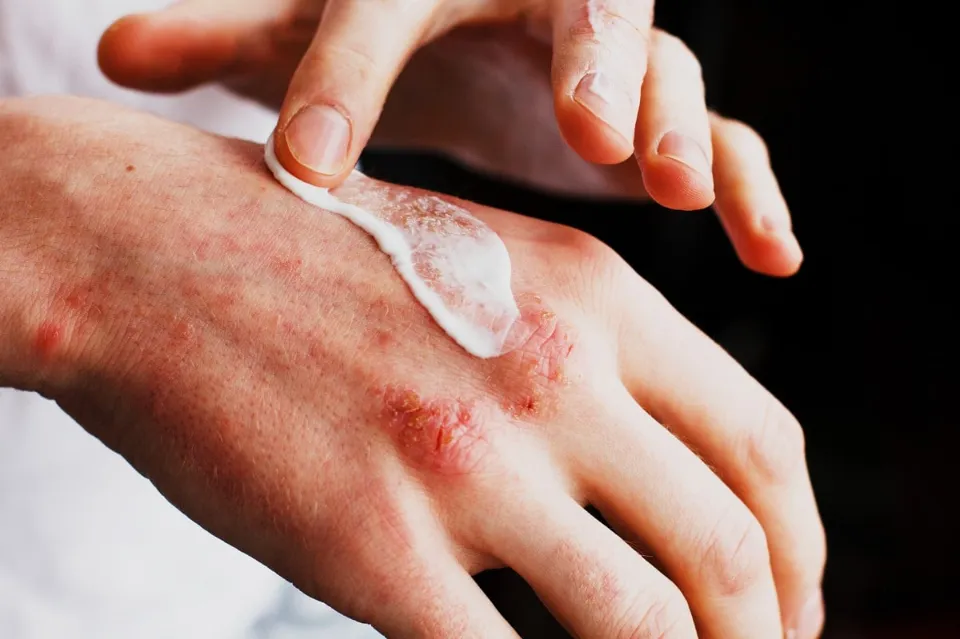
Petroleum, the main component of petroleum jelly, forms a protective barrier that aids in moisture retention and wound healing for your skin. Because it is hypoallergenic and has anti-inflammatory, antibacterial, and antifungal properties, petroleum jelly is a good choice for preventing and treating eczema symptoms.
Inflammation, allergens, and microbes can more easily penetrate your skin barrier when you have eczema because it can lead to broken skin. Your skin is now susceptible to infection, allergic reactions, and irritability.
The texture and appearance of your skin are improved as petroleum jelly strengthens and repairs your skin’s barrier. Your skin is shielded and kept moist by its thick texture.
Additionally, moisturized skin doesn’t develop scabs, which hastens the healing of wounds. Furthermore, it might lessen itching, which could prevent you from scratching as much.
Petroleum jelly is an excellent treatment for eczema flare-ups because it is well-tolerated and effective for sensitive skin. Petroleum jelly has soothing and moisturizing qualities that reduce irritation, redness, and discomfort, in contrast to some products that can sting and be uncomfortable.
Read More: Baby Eczema vs. Acne
How Do I Use Petroleum Jelly for Eczema?
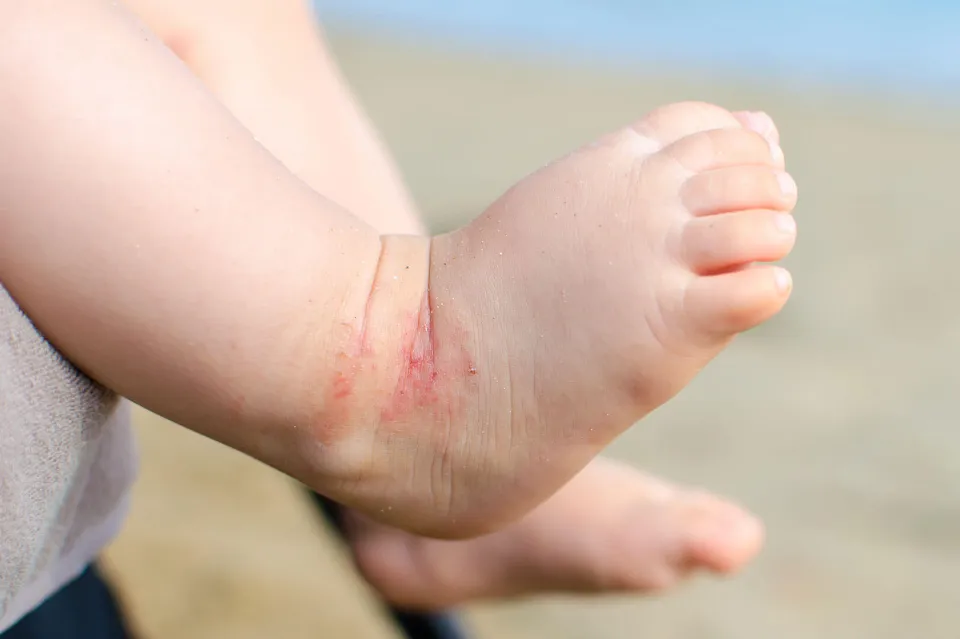
Eczema flare-ups can be avoided and treated with petroleum jelly.
When your skin is still damp from a shower or bath, apply the ointment right away to lock in moisture. Petroleum jelly comes in two varieties: pure and combined with a moisturizer. If you don’t want to use it all over your body, you can just apply it to sensitive or irritated areas.
Wet wrap therapy aids in locking in moisture and shielding open wounds from irritants, allergens, and microbes. Additionally, it reduces picking, scratching, and itching.
Here are the steps for wet wrap therapy:
- Gauze or cotton fabric should be lightly dampened with warm water.
- Wrap the dressing around the injured area.
- The wet dressing should be covered with a dry dressing, such as vinyl gloves, cotton fabric, socks, or gloves for your hands and feet.
- Dressings can be left on for a few hours or all night.
Are There Any Possible Side Effects?
Even though petroleum jelly generally gets along well with people and has many positive skin care effects, there are a few possible negative effects to be aware of.
Petroleum-derived products can cause allergic reactions, particularly if you have sensitive skin. Make sure there are no negative reactions by performing a skin patch test before using petroleum jelly or any other skin care product to treat eczema.
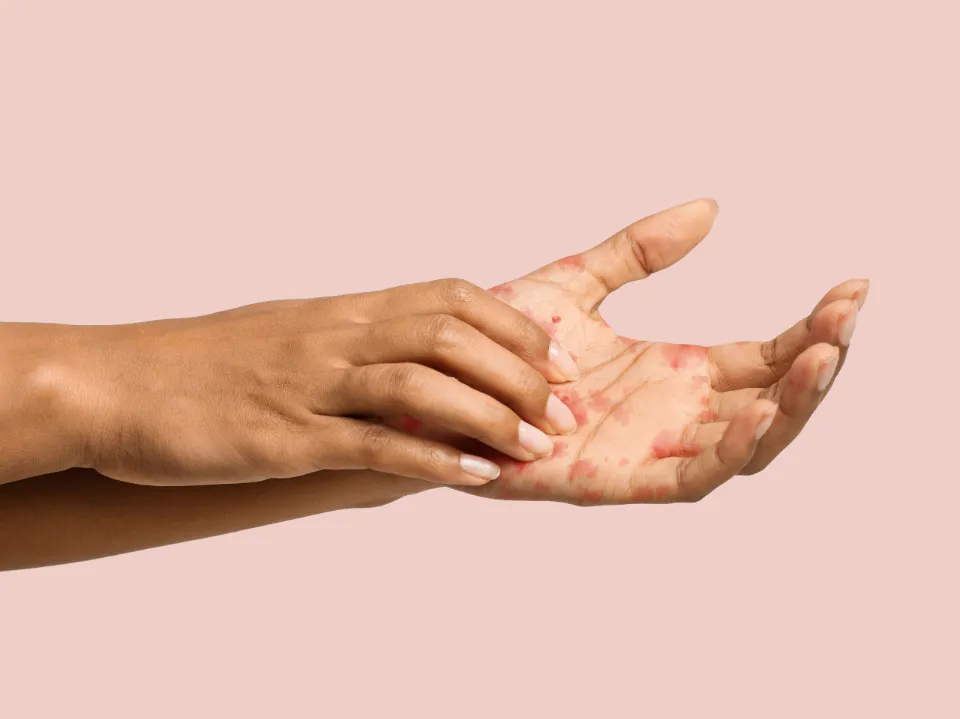
To do a skin patch test:
- On a small area of the skin, apply petroleum jelly.
- Gauze should be used to dry out the area.
- Remove the gauze and wash your skin if you get a rash, irritation, or discomfort.
- Petroleum jelly is probably safe for you to use if you don’t experience any negative side effects within 24 hours.
Oil-based products like petroleum jelly can trap irritants, microbes, and oils, which can cause an infection while also forming a barrier that keeps moisture in.
Before applying the ointment, make sure your hands and the area of skin where it will be applied are clean and dry to help prevent infection and breakouts. Don’t apply it to your face if you have a history of acne.
Keep your fingers away from the petroleum jelly jar to avoid bacterial contamination. Scoop the product out of the container using a disposable or sanitized spatula.
How to Get Rid of Eczema?
Unfortunately, it’s difficult to get rid of eczema. When you have eczema, you should see a doctor even though you can try to avoid triggers. They will advise you on the best creams and lotions to use based on the type of eczema you have. Along with this, your doctor may recommend techniques to combat the dryness and itchiness caused by eczema, such as the following:
Moisturizers
Moisturizing is a powerful tool that should never be ignored. Eczema-related dry skin can be managed with a regular moisturizing regimen. Rehydration and the enhancement of the skin’s natural healing process depend on moisturizing. Apply a light moisturizer to the skin after taking a warm (not hot) bath or shower to help restore moisture and relieve dryness. Keep in mind to use a moisturizer made for eczema and sensitive skin.
Medications
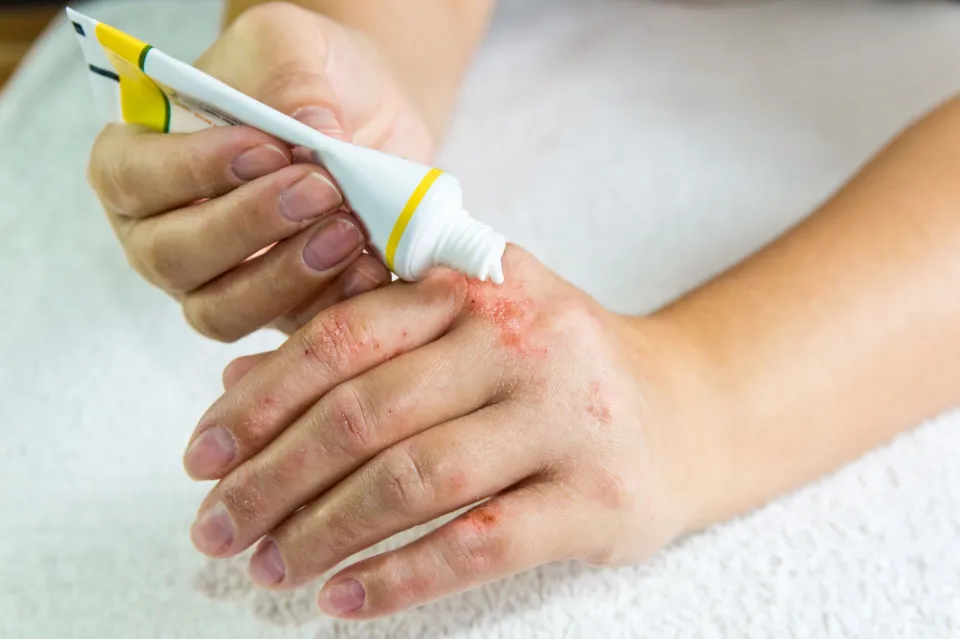
Topical hydrocortisone creams, which can be very effective at reducing itching, are one example of over-the-counter medications that your doctor might advise.
UV Therapy
The National Eczema Association reports that up to 70% of eczema sufferers have found success with phototherapy. A consistent treatment regimen that lasts for typically 1-2 months can help to lessen the itching and inflammation, boost the production of vitamin D, and aid in the skin’s ability to fend off bacteria. See if UV therapy might be appropriate for you by speaking with your doctor.
Vaseline Jelly
Applying an oil-rich, silky jelly can help to deeply hydrate particularly dry areas overnight. Apply Vaseline® Jelly Original to the hands or feet and cover them with gloves or socks afterward. As you sleep, the occlusive properties of the jelly will lock in moisture and aid in the skin’s natural regeneration process. Itching and dry skin will both be improved as a result. You can avoid scratching while you sleep by putting on gloves before going to bed.
Conclusion
You should use products that are compatible with your eczema and won’t worsen it if you have it. Eczema sufferers and people with sensitive skin conditions can use Vaseline Jelly Original. Petroleum jelly can be applied to eczema-prone areas to help with the symptoms of dry skin. Additionally, your doctor might advise using it along with particular eczema treatments.
FAQs
Is Vaseline Better Than Lotion for Eczema?
Because petroleum jelly is well tolerated and effective on sensitive skin, it is a great remedy for eczema flare-ups. Petroleum jelly has moisturizing and calming properties that reduce irritation, redness, and discomfort, in contrast to some products that can sting and be uncomfortable.
Why Do Dermatologists Recommend Vaseline?
Dermatologists advise using petroleum jelly to: Soothe chapped lips and dry eyelids; Relieve dry skin; and Save money on skin care. Dry skin has the potential to bleed, itch, flake, and crack. Petroleum jelly can be used on dry skin, such as your lips and eyelids, because ointments are more efficient and less irritating than lotions.
How I Cured My Eczema?
Although there is no known cure for eczema, people can frequently manage their symptoms at home with natural gels and oils, therapeutic baths, and dietary adjustments. One might want to see a doctor if their eczema is severe or does not improve with home remedies.





Average Rating